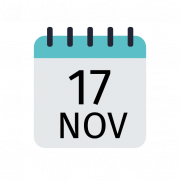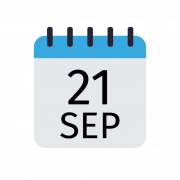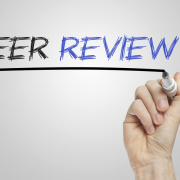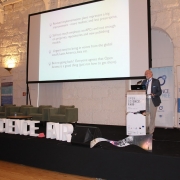ALLEA discusses Plan S at the Open Science Fair 2019
The 2019 Open Science Fair in Porto held on 16 to 18 September, featured a panel discussion on Plan S, the open access plan initiated by coalition of European funders to make all publicly funded-research open access from 2021.
On behalf of European academies and the academic community, ALLEA Board Member Luke Drury provided some insights on the current status of the project and underlined some of the key points introduced by the ALLEA statement on this matter.
The lively debate, chaired and facilitated by Inge van Nieuwerburgh (Ghent University), brought together various perspectives from national funding agencies, the so-called “Coalition S” and young researchers represented by Koen Vermeir, Chair of the Global Young Academy. The discussion focused on the need to include repositories and new publications models in order to avoid a continuation of the existing journal system.
The current status of Plan S was presented by Neil Jacobs, the interim programme manager for Plan S, who emphasised that there are, and always have been, multiple routes to compliance for Plan S and not only Gold Open Access. This model requires authors to publish their articles in an online open access journal in contrast to Green Open Access which allows for publishing in an a repository at the same time than releasing the research in non-open access journal.
The presentations from the event are available here.
Picture Credit: OSF
Ethical Aspects of Open Access Workshop: A Windy Road
The ALLEA Permanent Working Group on Science & Ethics organised the workshop Ethical Aspects of Open Access: A Windy Road on 1 February 2018, hosted by the Royal Flemish Academy of Belgium for Science and the Arts in Brussels.
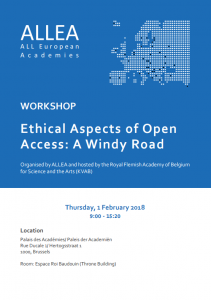
For anyone involved in academia, Open Access has become a topic hard to miss. The European Commission’s Open Science agenda as well as funding and research organisations alike encourage the open publication of research articles on an ever greater scale and with good reason as there is little doubt that publicly funded research should be as open as possible to the public.
Though, after around 15 years since the Berlin Declaration on Open Access to Knowledge, one of the most influential statements on Open Access, the research community must attest that several unintended consequences and ethical conundrums have marred the full-scale implementation of Open Access in the European Research Area.
ALLEA workshop
To identify some of these issues and to discuss possible solutions, the ALLEA Permanent Working Group on Science & Ethics organised the workshop Ethical Aspects of Open Access: A Windy Road on 1 February 2018, hosted by the Royal Flemish Academy of Belgium for Science and the Arts in Brussels. The event was attended by around 80 participants from across Europe.
The speakers of the workshop covered issues ranging from editorial responsibilities in the Open Access world to ways of identifying questionable and unethical publishers.
The speakers of the workshop covered issues ranging from editorial responsibilities in the Open Access world to ways of identifying questionable and unethical publishers. Further issues that were addressed were the need to balance transparency with resilience and the effects of Open Access on the assessments of research performance. Relevant organisations such as the Committee on Publication Ethics, the Directory of Open Access Journals, and EMBO were among the represented organisations.
The workshop was concluded with a panel debate, bringing together representatives from European academies, young academies, funding organisations, European universities, and the European Research Council.
The presentations of the workshop are available on the ALLEA website here.
A more detailed report of the workshop will be published in due course.


